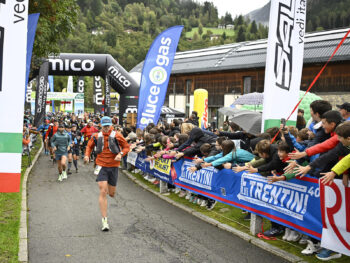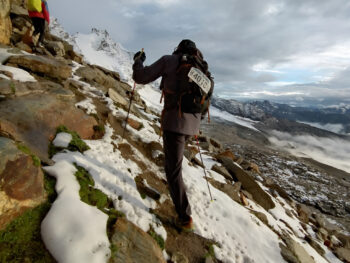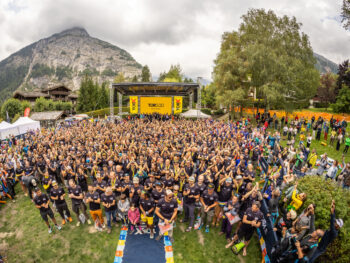
We inaugurate the new “Tor&Science” section with an interview with Pietro Trabucchi who will be in charge of it.
PIETRO TRABUCCHI
Pietro is a psychologist who teaches at the Department of Neuroscience and Movement Sciences at the University of Verona and at the CeRiSm Human Performance Research Center in Rovereto.
He was a psychologist for the Italian National Teams of endurance sports such as cross-country skiing, rowing and triathlon in three Olympics; and has many mountaineering expeditions all over the world (Everest, Denali, Elbrus, Kilimanjaro, Greenland) where he conducted scientific research and worked on the teams involved.
He is an “old school” trailer: he ran the first edition of UTMB in 2003, finished PTL several times, Tor des Geants and completed Yukon Artic and Rock and Ice in the Canadian Arctic. He has published several scientific research papers and some books.
HI PIETRO, SCIENCE IS BACK AT TOR. WHY?
Well, I could answer that science has never left Tor. It started to “accompany” it with the “zero” edition - the test that was carried out exactly one year before the race debut: it was necessary to understand if such a competition was feasible, before investing hundreds of thousands of euros in it.
Feasible not from an organizational point of view, but from the point of view of the participants: in other words, how could we be sure beforehand that “normal” people could complete the race?
We must keep in mind that fourteen years ago the perception of human limits in endurance was different. There were very few ultra-endurance races, not only in Italy but everywhere. And I remember that many were skeptical about the possibility that someone could finish the course.
So we set up a test edition together with the organizers - us as the Department of Neuroscience and CeRiSm research center on human performance - and some of us literally acted as “guinea pigs”, running the race. From then on we have greatly enriched our knowledge of human limits.
We must keep in mind that Tor represents an extraordinary laboratory for measuring human adaptability to physical and mental stress
And since then we have maintained a constant interest, edition after edition, in producing research on these topics: often together with other foreign universities. This year we will return - in fact we have already returned.
We have been conducting research for several months on what are defined in psychology as “coping skills” of the athlete; and in September we will also move for the first time to Tor des Glacier with a study that relates sleep deprivation, metabolism and stress.
Ascending Col Malatrà with a metabolimeter to measure the energy cost
Can you give some examples of the research carried out over the years at Tor. Do they also have practical value or are they very theoretical things?
Research must have practical implications, otherwise it is useless. Well, I can give three examples of research produced at Tor of which I am a co-author. The first is a study carried out together with the University of Lausanne: it showed that the progressive fatigue of the brain during the race results in a delay in postural adjustments for maintaining balance. This means that the longer the race lasts, the more likely injuries are to occur, especially downhill. It is important information to take into account when setting up the race strategy.
In another study by the Department of Neuroscience and Movement Sciences at the University of Verona, we showed that athletes’ bodies during the race “learn” to progressively save energy. This phenomenon is mainly due to the fact that the micro-coordination of the step improves more and more, day after day: that is, the nervous system recruits and contracts with ever greater precision only the fibers strictly necessary for that movement, isolating those not necessary. And this lowers energy consumption. In addition, there may also be an effect linked to the decrease in anxiety present at the start and in the first few days, which leads to a drop in stress hormones, with consequences on metabolism.
It is further proof that our body has unimaginable adaptability to cope with stress.
A third study, released last year in collaboration with Lausanne again, dealt with changes in spontaneous electrical activity in the brain due to not sleeping. Here the goal is to better understand the mechanisms altered by sleep deprivation; also to develop future protocols that help people better manage this problematic condition.
Here, in this section of the site I will periodically try to insert scientific information from specialist literature - or from ongoing research - to provide all the information that helps people improve and better manage their performance on Tor.
Tor 2013 research on the energy cost by climbing with the metabolimeter ON
So in the end, is scientific research working to “break down” human limits to performance?
No, human limits do exist! The “No limits” philosophy is a form of magical and naive thinking that often leads to harm, especially in the mountains. Instead, I believe that knowing your limits thoroughly - instead of denying them - is always a healthy practice: because only when you have found them (and frequented them for a long time) can you take a step beyond, you can grow.
No one ever becomes Superman, but we can all become a little better: and challenges like Tor certainly represent a great laboratory for training to do so.
Thank you Pietro.
Stay tuned, science is back at TOR!

© 2009-2024 by VDA Trailers SSDrl
Any dissemination for commercial purposes of photographic or video images captured during the event, via any means (internet, social networks, TV, press, magazines, etc.), without written authorisation from the organisation is prohibited. GTC®, GTC100™, GTC55™, GTC30™, TORX®, TOR®, Tor des Géants®, Tor des Glaciers™, Passage au Malatrà™, Tot Dret™, TOR450™, TOR330™, TOR130™, TOR100™ and TOR30™ are trademarks owned or used exclusively by VDA Trailers. Any communication of the event or use of images of it must be done in observance of the name of the event and registered trademarks, subject to agreement by the organisation.
Valle d’Aosta Trailers SSDrl | Via Roma, 98 | 11013 Courmayeur | CF/P.IVA 01139360075 | Nr. Iscr. Reg. Imprese AOSTA AO-70629


